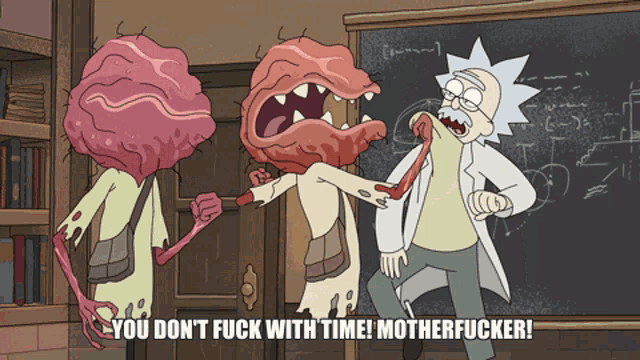Only because we have no idea what the impact of our actions (or inactions) will be (until it’s too late). If we knew the outcomes ahead of time — even if only a day from now — I guarantee you we all would act much differently; differently is indifferent to being simply “good” or “bad”, because there will always be people out there ready to take advantage of every situation.
fun fact, the initial attack on franz ferdinand failed. it was only after he went to the hospital to see the injured staffers, left the hospital, took a wrong turn somewhere–which just happened to be the street gavrilo princip was hanging out on–that he was shot and killed
a lot of people say wwi was inevitable anyway, but crazy to think the spark that kicked it off was due to a driver making a wrong turn, down exactly the street where the assassin was
edit: more info https://www.historyanswers.co.uk/people-politics/the-nearly-botched-assassination-of-franz-ferdinand/
see: The Good Place
I think the point is more along the line of “if we accept small actions could make a big difference to the future in the past, we also have to accept they could make a big difference to what it would have been if you hadn’t.”
I’m not saying I think you’re wrong in any of your reasoning for why those things would happen, just to be clear, and I think you’re right. To me, theyre not talking about acting “much differently.”
I get that. For me, at least, I often suffer from analysis paralysis:
- is this the right decision?
- Will this work?
- If I fail, what is the cost to me (financial, effort, emotional, etc)?
- Will other people be negatively affected?
And to simply say something like “shit or get off the pot” doesn’t really help either. So sometimes the only thing I can do is to do nothing. Which sucks. A lot.
I’ve been there and that sucks. Still am sometimes tbh.
I’ve been trying to practice turning my over analysis on my over analysis. It isn’t easy and it isn’t a cure or anything but I’ve found that the part of me doesn’t hold up to the same level of scrutiny as it expects from the rest of me. Trying that helped me a bit. I hope it might help you a bit too.
Yeah. I keep trying to tell myself to break those mountains down into mole hills. And when I start seeing the sea of mole hills, I try to remind myself to just pick one and start.
And then there’s the perfectionism. Or at least the make it decent enough that it won’t break when I look at it.
Some days are better than others. I have learned to accept that and not give myself such a hard time about it.
I went to my first protest this year. It was even out of state. Huge win in my book.
~Not world changing. But it did change me.~
Decision paralysis is tricky. Some good advice I got is just try to make the best choice you can in the moment and keep moving forwards. Something which isn’t great but is a step in the right direction now is often better than the perfect option days or weeks later.
We do know the outcome of many things based on what we can do today though don’t we?
Climate change, voting, smoking, drinking, speeding, touching the hot stove, eating the boiling magma hot pizza right out of the box, so on. Don’t we know the likely outcome of these things? Don’t we get told all the time w bad thing will happen if we do x and we still do them?
Because we don’t have to wait decades to see the change if we time travel. If we could do things now and then travel to the future to see how it turns out, we’d be more likely to. People are impatient. Not to mention if we have unlimited time travel we can keep trying different things.
Except if time travel were possible, and if it is possible to change the past, going to the past would be a reality-level roulette wheel. You travel back to an empty spot in the middle of Antarctica 100 years ago. You stay there for five minutes. Then you come home. Thanks to the butterfly effect, that tiny action would completely reshuffle the deck of history. Very few people currently alive would have ever been born. Just you being there would subtly alter weather patterns enough to completely change major weather events decades in the future, with all the knock on effects that would have.
This is the problem with trying to change the past. You can’t just make careful changes and slightly adjust the timeline. It’s completely rerolling history every single time you travel back.
There are very few situations where changing the past would this be worth it. You could use it for very short term changes. Prevent yourself from getting in that car accident. But whenever you start talking years, you’re just playing a game of chance you have zero control over. Traveling 100 years into the past means erasing anyone you have ever known or cared about. Maybe such a thing would be worth it to prevent civilization-ending catastrophes like a nuclear war. But otherwise there’s just no point. Changing history is not something you can have any say or control over. It’s purely random chance.
The Butterfly Effect is pure conjecture. There’s no way to know that just existing in a spot that you didn’t originally exist in would change anything noticeable. And since time travel has no concrete rules, as it hasn’t be achieved as far as we know, there’s no way to know how literally anything you did would affect things. My personal favorite model is where everything you do creates a separate timeline, eliminating the Grandfather Paradox.
“Time Police” is my favorite, cause it’s whimsical-ish. But infinite infinity is also a fun thought experiment


I wonder what the Department of Temporal Investigations thinks of Janeway. If Kirk’s a menace, what’s she??
The key difference is you know what will happen in the future
But not what your actions will do to change it. (key similarity)
We need a time travel machine to go back in time and kill hitler!
There are plenty of authoritarian people ruining the planet and committing genocide right now. Why not do something about it if you’re so gung ho?
I don’t need a time machine to change the future. I need a space machine so I can appear next to the current Hitler so I can kill him.
it’s called transport
Ok now I want to start randomly calling vehicles “space machines”
Because the present will judge me harshly for it. And I ended the future that would be the most grateful for my present actions! Don’t you understand?
/s
They tend to have pretty good security.
One theory could be that Fascists who idolize Hitler and the authoritarians take over when time travel is invented, so they don’t want to kill Hitler and that’s why he lived during our timeline.
Dun dun duuuun.
This is one of those comments that seems deep but when you spend 10 seconds thinking about it really isn’t.
I live in the present, if I want to change who’s in charge of a nation it takes years of effort. I can’t just shortcut that with my magic time machine. Plus of course I have to live through the transition period so it’s not just about skipping the time it’s also about dealing with the consequences.
If I step on an ant it may very well radically old to the future, but if I have to wait the 10 million years to find out then I’m probably not going to be able to tell.
Yep, the issue is the
I’ it need to organize as a wide collective to do such thing. And then, it do not need a lot of effort to do such thing. We could argue that in working for a collective, you may execute the order and not impact the line of that organization; it’s true, except in organization that are self-managed
Of course we are changing the future all the time.
The problem is that we don’t know how it is supposed to go, so any future is fine for us.
Part of it is that minor changes can be incredibly disruptive to our personal lives, while having no meaningful effect on the bigger picture.
There was a movie (About Time I think) where this lineage of guys can time travel as some inhereted ability. They have a strong rule within the family though to never time travel to before one of their children is born, because the smallest change can result in a different sperm/etc and finding they have completely different child when they return to the present.
I assume that rule is a setup for conflict?
I actually think that’s because “the butterfly effect” has been massively overblown in time travel media.
Like, realistically the biggest issue with you going back in time is that you’d probably end up introducing a plague in the past that would wipe out a ton of life; not exactly a minor change. However, if we ignore that, and you don’t try to do anything radical like inventing electricity a thousand years too early, what would your presence in the past actually do? As long as you were willing to keep your head down, learn the local language, and live the peasant life, what grand consequences could you cause? None.
Not necessarily a grand consequence, but lots of small things add up and you’ll end up living in a different sort of world.
I think the best part of a lot of time travel movies is people trying to figure out whatever they managed to change… Obviously usually it’s like two degrees of separation from some massively historically important person and Nazis end up winning WWII.
That’s probably the easiest way to it. But equally if you changed the outcome of WWI you might save the world from Hitler. But then perhaps you end in 2025 with like 70’s technology, because no massive wars drove money to inventions like radars and nukes. Oh and rockets, V2 rocket and Nazi rocket scientist helped us get to space.
Not a time travel movie but me just listing those reminded me, “For All Mankind” is a nice show, starts from the space-race and the history isn’t massively different, but a thing goes differently than in history and then you’ll see how it effects the space race and the world in general.
The though experiment behind the butterfly effect is: Assume a weather simulation, which is extremely precise, but there’s a butterfly, that flaps its wings, which is not accounted for in the simulation. This will, after a while, cause the simulation to divert so wildly from reality that its no better than chance at predicting the weather.
So applied to time travel, you’d come back to a world that is drastically different from the one you left, but not necessarily better or worse than the one you left.
Sure, in an on paper theory. My argument would be that the butterfly flapping its wings are not nearly strong enough to change the flow of weather in reality.
I don’t know why commentors are thinking I don’t understand the theory. I do, I simply do not believe that it maps to reality. It’s ultimately been taken too far as a trope, even though most of its examples in media often involve characters making dramatic changes.
I don’t think you understand the theory at all considering that the central concept of defining any system as chaotic is that the tiniest imperceptible change of initial conditions leads to an unpredictable product.
If you think the strength of the butterfly wing is insufficient for this theory to map to reality then you have missed the point entirely of why a butterfly was chosen as the example to describe this theory.
The butterfly effect is not about directly causing meaningful change in the past.
It seems you missed the point of my comment. My argument is that the actual chance that your actions indirectly causing a meaningful change down the line is realistically zero. If you go and live a simple peasant life, I don’t think +1 peasant in say the Holy Roman Empire will cause any repercussions.
Ah. In that case, I think you’re wrong.
If I were a precog, you bet your ass I’m going to play the stock market until I’m rich enough to put out several non-profits for basic things like food production, housing, and health care. Add some competition to the mix to bring prices down for everyone, whilst side-stepping assassinations and underhanded political moves by my detractors, and each time I make money I immediately spend it in some public good, so that other investors trying to predict the market simply copy my investments and also start investing in public projects.
I’ll turn my enemies into friends by showing them a world where everyone can benefit, and hopefully the idea of money itself will simply melt away as we shift towards a resource-based economy where everyone’s basic needs are met, and people can live their lives will full agency as long as it does not impede on the agency of others.
I’ll turn my enemies into friends by showing them a world where everyone can benefit
What about those who don’t want everyone to benefit if it means that someone else might do as well or even better than them? Those who would rather push others down just to be above? Those driven not by the wish to thrive, but by aspirations of supremacy?
The world you describe sounds wonderful for everyone with empathy, but it only works for those content with their own prosperity or actively interested in the common good.
There will always be aberrations of morality that would attack you.
But I’d stand with you.
(Read Beggars in Spain by Nancy Kress, one of the characters makes the exact same plea)
I dont know about them. There will always be people who behave badly. But soceity shouldn’t be a dictatorship and if people cannot live by the social contract of others, they should be free to leave and start their own soceity unmolested elsewhere.
If people living in these freer soceities are beginning to feel mistreated, they should have the freedom to come back
I wasn’t disagreeing with you. I just wanted to add the reminder that the ideal of turning enemies into friends by showing them a better world will not work on everyone, and we must be ready to deal with that discrepancy between idealism and realism.
Reason and argument should be the first resort, to be sure. I also agree that those who don’t agree with that social contract should form their own society, separate from the rest of us, and that there should always be an open door to (re-)immigrate, if they’re willing to abide by the contract.
However, I anticipate that not all will leave willingly, nor will they leave us unmolested if they do. We must be willing and ready to defend our society against these enemies.
Force should be a last resort, but it must be a resort. There are people who will never be convinced, because a society that’s good for everyone else is incompatible with their need to inflict suffering. To the privileged (or those who feel they should be), equality feels like oppression.
I occasionally see people arguing that we should never force people to comply with our social norms. My intention here is to point out that, at the very least, we should reserve the right to force these people out of our society.
I agree with your ideal, and I would gladly stand by you. I do not mean to take away from that. I want to cover the gaps.
(oh I know you weren’t disagreeing, sorry if my tone came across like that!)
I mean yeah – ultimately it boils down to whether the social contract (equality/tolerance) is one that should be enforced, and how rigid that contract should be.
Fascism tends to descend in gradual stages, where lines are crossed repeatedly but slowly enough that people no longer see the lines anymore. So having a rigid and well-defined social contract (somewhat like a constitution) that will bring out the troops as soon as one of the tenets is breached should (theoretically) provide a filter for the bad apples.
Of course, a society like that build upon such a rigid constitution will never evolve with the times.
So I don’t really know what the answer here is
(oh I know you weren’t disagreeing, sorry if my tone came across like that!)
Oh the joys of communication by text online 😄
whether the social contract (equality/tolerance) is one that should be enforced
Here, I agree with Karl Popper that a tolerant society which permits intolerance is doomed to be undermined, as you outlined with the gradual descent. In this case, I believe that means the contract needs to be enforced if it is to have any meaning at all.
Of course, a society like that build upon such a rigid constitution will never evolve with the times.
Usually, a body of law consists of both a rigid, more general constitution laying down the fundamental values and principles by which the polity in question is governed, and a more flexible and specific set of laws designed to be malleable and evolve with the times. There is also often some leeway in enforcing those laws in order to allow a more fine-grained case-by-case handling.
The vulnerability we observe right now is that the processes designed to govern the modification and application of that contract require a degree of engagement, leisure and education in order to make informed decisions, critically question claims and also reflect on your own preconceptions. A society seeking to remain free and democratic must afford its citizens the luxury of participation and encourage them to get involved.
I don’t need to point out all the ways this is going poorly.
require a degree of engagement, leisure and education in order to make informed decisions, critically question claims and also reflect on your own preconceptions. A society seeking to remain free and democratic must afford its citizens the luxury of participation and encourage them to get involved.
Hear hear
I guess it’s often just hard to see how the tiny things we do affect people when we’re living in real time. If I make someone smile at work or on here, I won’t see how that smile prevented them from getting into a stressed out argument with someone later on, that kept them from losing their job, which kept them from holding up a store to make ends meet. It’s easy to look back and say somebody shoulda kept that Austrian from coming to power back in the day though.
We don’t typically get feedback about our tiny moments. I try to post happy stuff here (or at least helpful) and it always feels so good when people say that I gave them a smile for the day. I don’t know what kind of days you all are having, and if an inconsequential thing I do can give you a boost, I think that’s an awesome thing. Hearing that makes me feel better on days I’m really down on myself as well. I try to let people know how important their interactions are, but a lot of people find it difficult to accept that compliment or see it as not sarcastic, because a lot of people don’t seem to take that time.
It might make you happy to learn about the Pareto Principle. The basic idea is “that, for many outcomes, roughly 80% of consequences come from 20% of causes”
In this context (and to my understanding, which as a layperson, may be flawed), I figure that only 20% of people who get a smile from your comment would make 80% of the comments actually telling you they smiled. That means there must be many more people who took joy from whatever you said/did, but only about 1 out of 5 of them commented about it.
You’re likely spreading more smiles than you realize. ☺️
This is one of the reasons I like the lemvotes tool that lets anyone see the names of who upvotes or downvotes. While it is easy to use it for petty reasons, I first used it to show myself 99% of my downvotes are likely just accidents, and only 1 person on Lemmy actively hates me, owls, or both. The main thing I love about it is I get to see the lurkers that may not have anything to say, but quietly enjoy what I do. The upvotes themselves don’t mean much, but it reminds me those are people showing love for the things I share.
I try to post happy stuff here
Thank you. I appreciate it.
I am glad to hear it! 🦉
The difference is, You’d know what to change in the past.
Sounds deep if you don’t think about it too much, but it’s a false equivalence.
I would bring forbidden magnet knowledge and be killed for being a sorcerer in a week
Would radically changing the present be such a terrible thing?
No. We’re in one of the horrible future timelines that the main character has to go back to fix.
Well good for the main character I guess. We’re still stuck in this one.
Yup, that’s how it would go in those stories. Either the timeline goes away once the changes are made, or the people have to keep living with it. Lucky us.
You would have to kill everyone alive, so there’s that issue.
I mean it’s not such an issue tbh.
If i could go back in time…
I’d go back two weeks and just put my car-key in a slightly different location, creating a minor, brief inconvenience for my past self. Muahahahaha.
Your small joke seems to have caused a rupture in the space-time continuum, dooming humanity to relive the same two weeks forever. Nice!
Oh crap. Sorry man. Won’t happen aga…ah shit.
I hope I’m on vacation those weeks.













